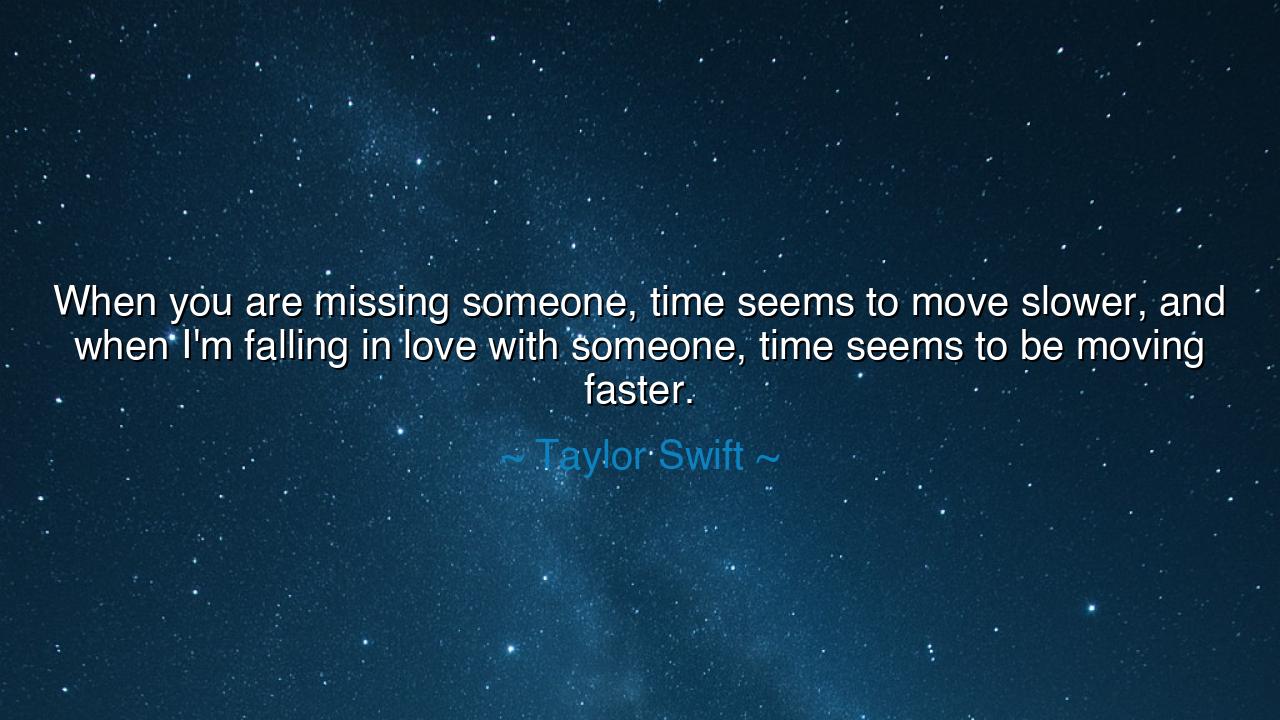
When you are missing someone, time seems to move slower, and when
When you are missing someone, time seems to move slower, and when I'm falling in love with someone, time seems to be moving faster.






“When you are missing someone, time seems to move slower, and when I'm falling in love with someone, time seems to be moving faster.” Thus spoke Taylor Swift, a poet of the modern age, whose songs, though born in melody, carry the heartbeat of timeless truths. In these words, she gives voice to the mystery of time and emotion, the strange power of the heart to bend the rhythm of the world. For when love touches us — whether in longing or in joy — the ticking of the clock ceases to be steady. Love changes time itself, slowing it in absence, quickening it in passion.
At first glance, her words seem simple, the musings of a heart in love and loss. Yet beneath them lies the same insight that poets, mystics, and philosophers have pondered since the dawn of humanity. For time, as Swift reminds us, is not merely a measure of hours, but a mirror of the soul. When we are lonely, each second drips like a tear upon the ground, heavy and unending. When we are in love, the same seconds dance like sparks, vanishing too soon. The outer world remains the same, but within us, the rhythm of eternity trembles — and that trembling is the song of love.
The ancients knew this well. In the writings of Plato, love is described as the divine madness that lifts the soul beyond the ordinary — where moments burn brighter and life becomes a fevered dream. To love is to be consumed by the eternal now. Swift’s words capture this same ancient truth, clothed in the softness of modern emotion. When she says that “time seems to move faster” while falling in love, she speaks of that sacred intoxication where the heart no longer counts minutes, for every instant is filled to overflowing. And when she says that “time seems to move slower” in longing, she names the ache of the empty hour, when absence stretches the soul across the endless corridors of memory.
To feel such a contrast is to be truly human. It is the proof that love is not a mere sentiment, but a force that reshapes our experience of the world. Consider the story of Penelope, wife of Odysseus, who waited twenty years for her husband’s return. To her, each day was a century, each night an eternity of solitude. Yet for Odysseus, battling storms and temptations, time raced as though in a dream. One lived in the slow ache of waiting, the other in the swift rush of striving. In both, love altered time — one by stretching it, the other by consuming it. Such is the paradox of the heart.
Swift’s quote also reminds us that the flow of time is governed not by the stars or clocks, but by presence and connection. When we are with someone we love, moments seem to dissolve, leaving only the brightness of shared laughter, the warmth of closeness. Yet when that presence is taken away, time expands into emptiness — a reminder of what was and what is no longer. Love, therefore, teaches us not just joy, but awareness — for it makes us feel time with unbearable clarity, in both its fleeting beauty and its relentless stillness.
There is wisdom, too, in recognizing that both the slowness of longing and the quickness of love are sacred teachers. The slowness of missing someone teaches patience, memory, and the depth of the heart’s capacity to endure. The swiftness of love reminds us of the urgency of life — that beauty passes, and we must cherish it while it is here. To love, then, is to live at the extremes of time, to feel both eternity and impermanence pressing against the soul.
So, O seekers of the heart’s rhythm, take this truth and hold it gently: time obeys love. Do not curse the slow hours of longing — they deepen you. Do not fear the swift days of love — they awaken you. Together, they shape the soul into wisdom. When time moves slowly, remember that it is teaching you the art of endurance. When it moves swiftly, remember that it is whispering the fragility of joy.
For in the end, as Taylor Swift so tenderly reveals, love is not measured by time — time is measured by love. It stretches, it flies, it pauses, depending on the beat of the heart. Therefore, live fully in both the ache and the ecstasy. Cherish every slow hour of missing, and every fleeting moment of falling — for in them, you touch what the ancients called the divine pulse of existence, where love and time become one.






AAdministratorAdministrator
Welcome, honored guests. Please leave a comment, we will respond soon